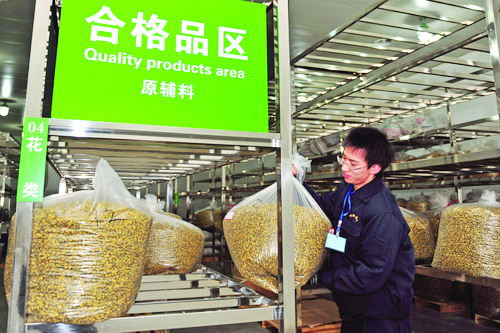
Supportive govt policies expected to help industry develop in long run, say experts
China's supportive policies on the international trade of traditional Chinese medicine care services are unlikely to produce notable progress over a short period of time and operators should trade in a "wise" way, insiders said.
"We don't think the encouraging policies will benefit the TCM service exports immediately but, in the long run, the trade sector is expected to develop faster and faster thanks to the policy framework," said Liu Zhanglin, vice-president of the China Chamber of Commerce for the Import and Export of Medicines and Health Products.
The government said it will establish a complete TCM service trade administration system, set up a trade promotion and marketing system targeting the international market and formulate industry standards within five years. Meanwhile, preferential taxation and fiscal investment in research and development projects are to be offered.
"All of these need time, especially the industry standards," said Liu, adding that TCM principles are based on experience rather than experiments adopted by Western treatment methods. "We need a set of standards combining Eastern experience with Western technical experiments that can be recognized by the international market, which is not something that can be achieved overnight."
|
 A quality control inspector examines a bag of traditional Chinese medicine in Yichang, Hubei province. The government said it will establish a complete TCM service trade administration system, set up a trade promotion and marketing system targeting the international market and formulate industry standards within five years. [Photo/China Daily] |
Nonetheless, Liu said the policy is certainly a positive sign for the industry. With more government funding involved, the legal system improved, 10 trading centers established and a unified database set up, the industry will develop sound competition and cooperation regarding development.
The government decided to use TCM products and services to aid developing economies and regions that, in the long run, will nurture a big market abroad, said Jiang Weina, an analyst from Orient Securities Co Ltd.
Statistics from the State Administration of Traditional Chinese Medicine show that the trading volume of TCM services was nearly 2.5 billion yuan ($397 million) last year, compared with the nation's total international service trade volume of $419 billion. Liu said that the TCM service trade figure did not include the inbound medical travel sector.
China now has 36,000 institutes engaged in TCM medical services, research and training, 803,000 certified TCM teachers and 15,000 people involved in TCM innovation projects.
At present, faced with technical standards and market access problems, TCM service operators should undertake "practical" and "wise" ways to enter the market and expand their presence step by step.
There are currently four channels within the TCM service trade. One involves attracting overseas visitors to experience inbound medical travel, another provides remote services via the Internet and there are also Chinese TCM doctors going abroad to practice treatments or open clinics.
Regarding the first two, Chinese TCM service providers have accomplished most of their aims and will progress fast in the coming years, according to Huang Jianyin, general-secretary of the World Federation of Chinese Medicine Societies. "Currently, operators should pay plenty of attention to service quality because these kinds of services can help build the image or reputation of TCM in the minds of foreign customers, facilitating the operation of outbound services in the future," he said.
As for providing services overseas, whether to practice medicine or launch clinics, there is not much market acceptance and entry is currently not easy.
Dai Biao, general manager of Tasly International Marketing Holdings Co Ltd, suggested TCM practitioners should take advantage of overseas resources first instead of directly launching independent businesses abroad.
"Compared with establishing independent clinics overseas, setting up TCM departments affiliated to local hospitals is a more practical way and a shortcut for Chinese TCM operators to enter the overseas market. It is also easier to be accepted by local patients," said Dai, whose company is trying to introduce domestic TCM service providers to cities covered by its overseas sales network.
liujie@chinadaily.com.cn